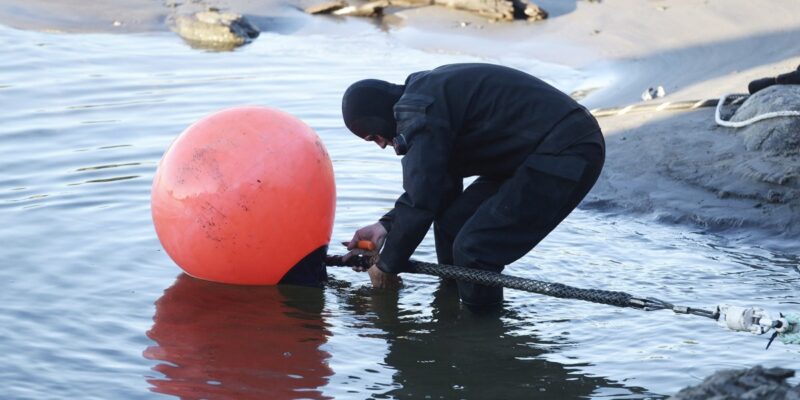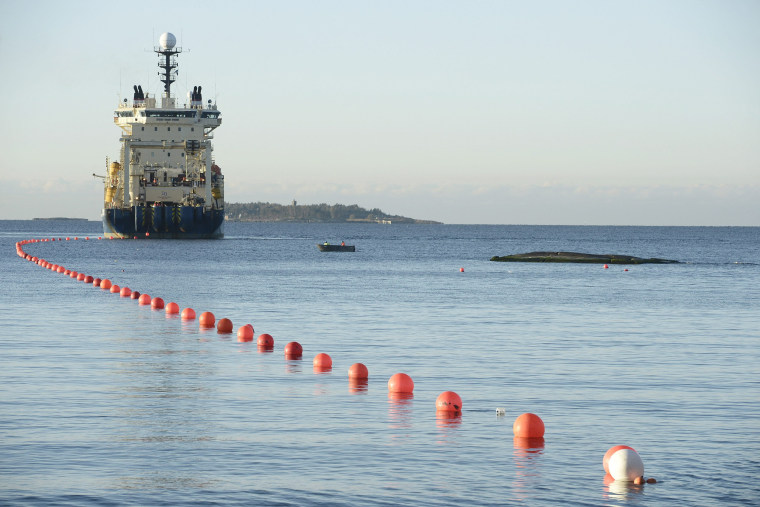
U.S. allies warned of “hybrid warfare” Tuesday after two undersea communication cables were severed in the Baltic Sea, raising suspicions that they may be the latest acts of sabotage targeting the West as it clashes with Russia.
German Defense Minister Boris Pistorius said Tuesday that “no one believes that these cables were cut accidentally” after a rupture in a 730-mile cable linking Germany and Finland was detected Monday.
“We have to state, without knowing specifically who it came from, that it is a ‘hybrid’ action,” he said. “And we also have to assume, without knowing it yet, that it is sabotage.”
Lithuania’s navy said Tuesday that it had increased monitoring of its waters after damage to a separate cable connecting the Baltic nation with Sweden’s Gotland Island was detected on Sunday.
Swedish operator Arelion told NBC News on Monday that the company was “in contact with Swedish authorities and the Swedish Armed Forces regarding the incident.”
The parties involved in both ruptures — all members of NATO — stopped short of pointing fingers, but eyes immediately turned to Russia.
The news came as President Vladimir Putin formally lowered the threshold for his country’s use of nuclear weapons, days after the United States allowed Ukraine to strike inside Russia using American missiles. And Nordic countries released new guidance advising residents on how to survive a war or similar crisis.
“European security is not only under threat from Russia’s war of aggression against Ukraine, but also from hybrid warfare by malicious actors,” the foreign ministers of Germany and Finland said in a joint statement Monday.
Western officials have accused the Kremlin of intensifying a campaign targeting Ukraine’s allies while assaulting its neighbor in a war that reached 1,000 days on Tuesday.
“Russia is systematically attacking European security architecture,” the foreign ministers of Germany, France, Poland, Italy, Spain and the U.K. said in a joint statement.
“Moscow’s escalating hybrid activities against NATO and E.U. countries are also unprecedented in their variety and scale, creating significant security risks.”

The C-Lion1 submarine telecommunications cable runs between Finland and Germany. Heikki Saukkomaa / AFP – Getty Images
A Western security official told NBC News earlier this month that Russia was responsible for sending two incendiary devices to DHL logistics hubs in Germany and the United Kingdom in July, as part of a wider sabotage campaign to possibly start fires aboard aircraft bound for North America.
The head of Britain’s intelligence agency MI5 said last month that Russia’s GRU intelligence service was on a mission to generate “sustained mayhem on British and European streets.”
Both Finland and Sweden have joined NATO in the past two years, bolstering the alliance’s eastern flank in the wake of Russia’s full-scale invasion of Ukraine.
Russia has repeatedly rejected allegations from Western countries that it is orchestrating a sabotage campaign in Europe.
Damage to other infrastructure in the Baltic Sea has raised fears of sabotage in recent years.
Explosions in September 2022 damaged Nord Stream pipelines, built to carry Russian natural gas to Germany under the Baltic Sea. The damage added to tensions over the war in Ukraine as European countries moved to wean themselves off Russian energy sources.
Who was responsible for the sabotage remains a mystery, and German prosecutors are still investigating the explosion, which sparked theories that either Ukraine or Russia might have been behind the blasts.
In August, Beijing admitted that a Chinese-owned ship damaged a critical Baltic Sea gas pipeline running between Estonia and Finland in October 2023. It said it was an accident.
Sub-sea cables crisscross the world beneath the oceans, but simmering tensions between Russia and western nations has brought their geopolitical importance into sharp focus.
The telecommunications cable running between Germany and Finland that was severed is known as the C-Lion1 cable, and is the only direct connection of its kind between Finland and Central Europe. It runs from the German city of Rostock to the Finnish capital Helsinki.
Such cables are laid by specially-modified ships that carry the cable on board and slowly lay it down on the seabed. When they’re damaged, divers or small submersibles are sent down to investigate any cuts before the two ends are brought to the surface for repair.
Finnish operator CINIA said Monday that the repair time for submarine cables is between 5 and 15 days.
Escalating anxieties over Russian attacks beyond its war with Ukraine have spread through northern Europe in recent months as governments advise their citizens on how to prepare for crisis.
On Monday, millions of people in Sweden began receiving a pamphlet advising them on how to prepare and cope in the event of war.
“In case of a crisis or war,” is an updated version of a pamphlet produced six years ago, but it is now twice the size with guidance on evacuation, terror attacks, and “how to stop bleeding.”
Neighboring Finland has also published new advice online about how to prepare for crisis events, and Norwegians also recently received a pamphlet urging residents to be prepared for war, extreme weather, and other threats.















